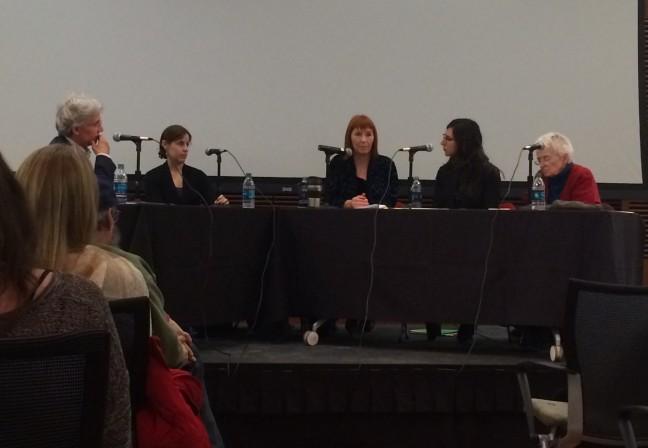Panelists at a campus-wide forum on ‘Confronting Campus Rape’ Monday said the University of Wisconsin System has failed to address the issue properly and called for policies which better protect victims of sexual assault.
Hosted at the Discovery Building, a panel of four women discussed the issues surrounding campus rape and actions that should be taken to ensure the safety of victims of sexual assault.
Anne McClintock, an English and gender and women’s studies professor at UW, explained how rape can be misconstrued in a college setting. Rape is an act of violence that uses sex as a weapon to overpower another, McClintock said.
“I think one of the most common and dangerous misconceptions of rape is what is actually happening on our campuses, which is that rape is just simply kids getting drunk and getting into hookups that go wrong,” McClintock said. “What the research has shown is that this perception of rape is monstrously and dangerously wrong.”
Alcohol is becoming some kind of scapegoat for rape, McClintock said. But, drinking alcohol will not make someone a rapist, and the excuse is a tactic for serial rapists, McClintock said.
Natalie Weill, a senior at UW and victim of sexual assault, characterized her experience as a victim of rape and her efforts to get justice within the constraints of the UW System. Chapter 17 of UW policy is designed to protect the rights of the perpetrator, Weill said.
“Official university policy is to not expel students who rape, even the students who the university has found responsible for committing crimes of rape,” Weill said. “Chapter 17 delineates a shocking injustice to the students who need it to seek safety.”
Under policies of Chapter 17, Weill said she was put through grueling interrogations after months of persistent efforts to convince the deans to expel the offender.
Even outside the UW System there are glitches in the process of getting justice for sexual assault, Cecelia Klingele, a law professor at UW, said. Convicting a sexual offender is difficult because once convicted, the stigma stays with them for life, Klingele said.
“We don’t want innocent people convicted of crimes that they didn’t commit and deprived of their liberty and stigmatized for life if the offense is a sex offense,” Klingele said. “Because of that, the bar is very high.”
The way to approach campus rape is challenging, as focusing on certain instances takes away form the bigger picture, Claudia Card, a philosophy professor at UW, said.
By zeroing in on specific occurrences of sexual assault and not looking at the issue of rape as a whole, the university creates an unsafe environment, she said.
“It is not only survivors that are being failed but future victims as well, which includes lots and lots of women on campus,” Card said.
In order to ensure the safety of victims of sexual assault on campus, McClintock said she believes UW needs to instill a zero tolerance policy for rapists.
Expulsion throughout the UW System, not just at UW-Madison, is necessary to allow students to continue their education in a safe environment without the fear of bumping into their assailant, McClintock said.
“This university expels students for plagiarism but not for rape, yet surely it is more important to expel for rape,” McClintock said.


